HI6005: Management and Enterprise in Global Environment Analysis
VerifiedAdded on 2023/06/14
|9
|1884
|465
Report
AI Summary
This report examines management and enterprise within a global environment, focusing on key management theories, the impact of globalization, and the influence of national culture. It discusses various academic fields impacting management, including political science, economics, psychology, and sociology. The report explores historical management practices and modern management theories such as scientific management and general administrative theory. It also delves into the nature of globalization, highlighting factors affecting it and expert views on the subject. Cultural differences and their impact on business operations are analyzed using frameworks like Hofstede's and Trompenaars' models. The report concludes by emphasizing the challenges and opportunities globalization presents to organizations and the importance of understanding cultural nuances in international management.
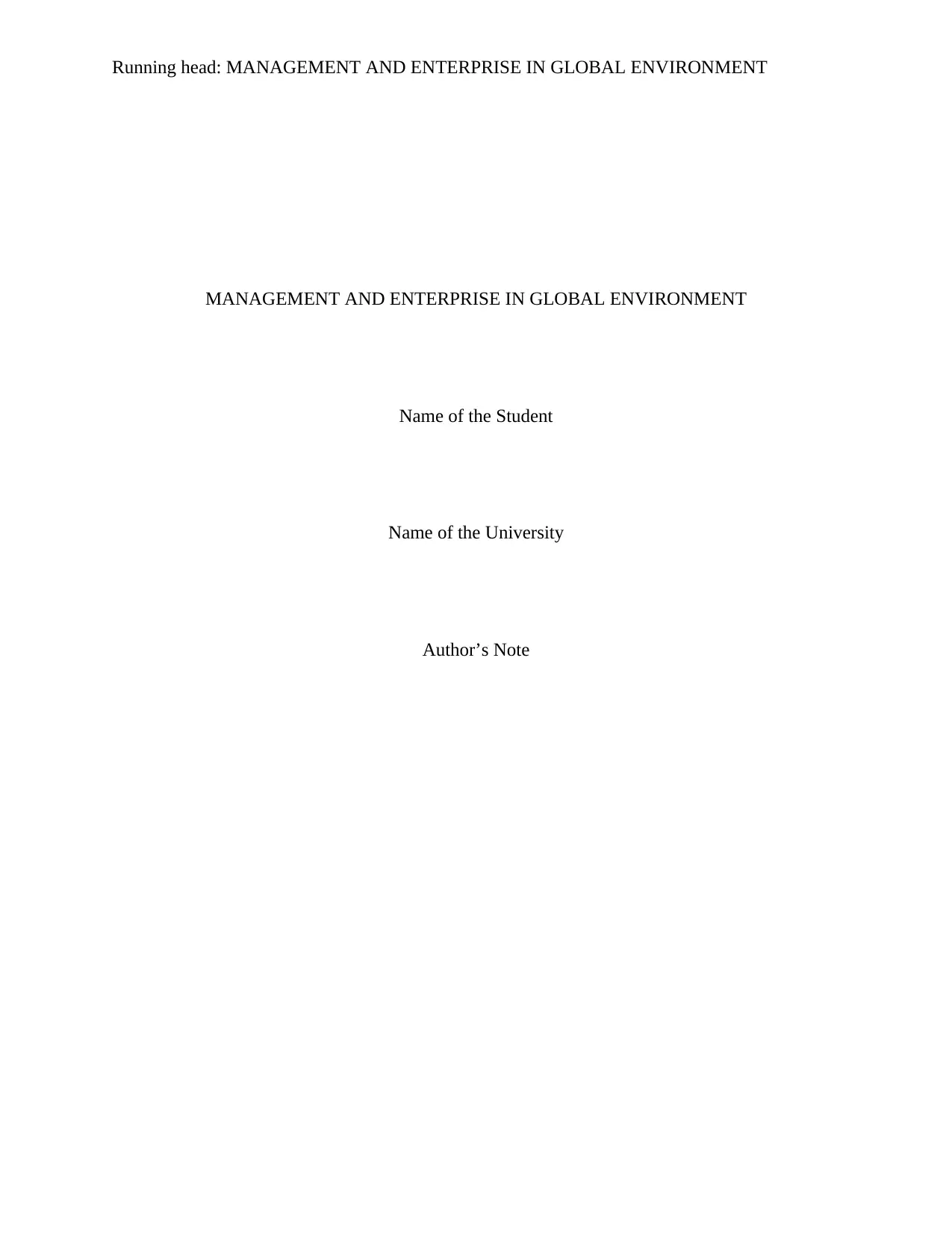
Running head: MANAGEMENT AND ENTERPRISE IN GLOBAL ENVIRONMENT
MANAGEMENT AND ENTERPRISE IN GLOBAL ENVIRONMENT
Name of the Student
Name of the University
Author’s Note
MANAGEMENT AND ENTERPRISE IN GLOBAL ENVIRONMENT
Name of the Student
Name of the University
Author’s Note
Paraphrase This Document
Need a fresh take? Get an instant paraphrase of this document with our AI Paraphraser
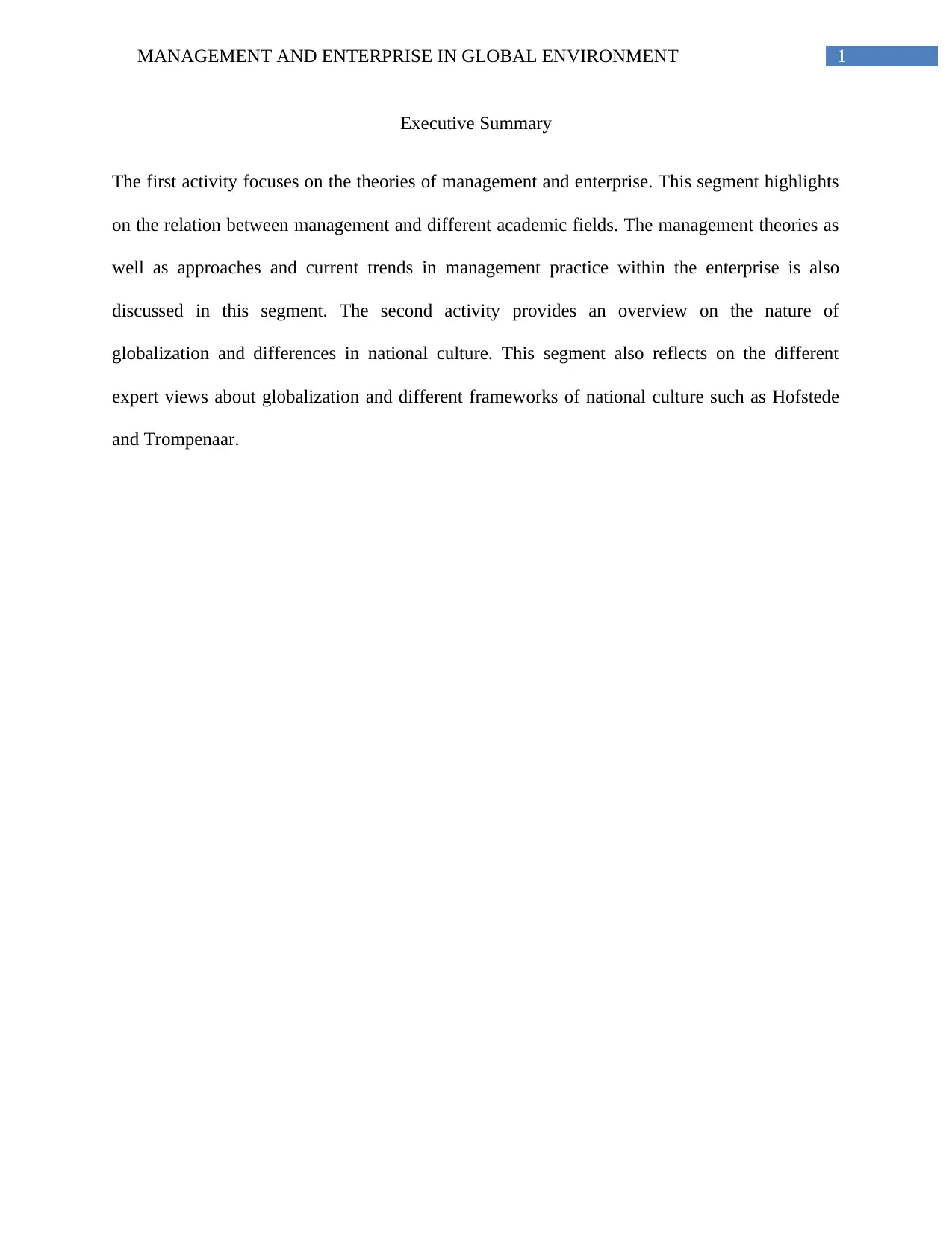
1MANAGEMENT AND ENTERPRISE IN GLOBAL ENVIRONMENT
Executive Summary
The first activity focuses on the theories of management and enterprise. This segment highlights
on the relation between management and different academic fields. The management theories as
well as approaches and current trends in management practice within the enterprise is also
discussed in this segment. The second activity provides an overview on the nature of
globalization and differences in national culture. This segment also reflects on the different
expert views about globalization and different frameworks of national culture such as Hofstede
and Trompenaar.
Executive Summary
The first activity focuses on the theories of management and enterprise. This segment highlights
on the relation between management and different academic fields. The management theories as
well as approaches and current trends in management practice within the enterprise is also
discussed in this segment. The second activity provides an overview on the nature of
globalization and differences in national culture. This segment also reflects on the different
expert views about globalization and different frameworks of national culture such as Hofstede
and Trompenaar.
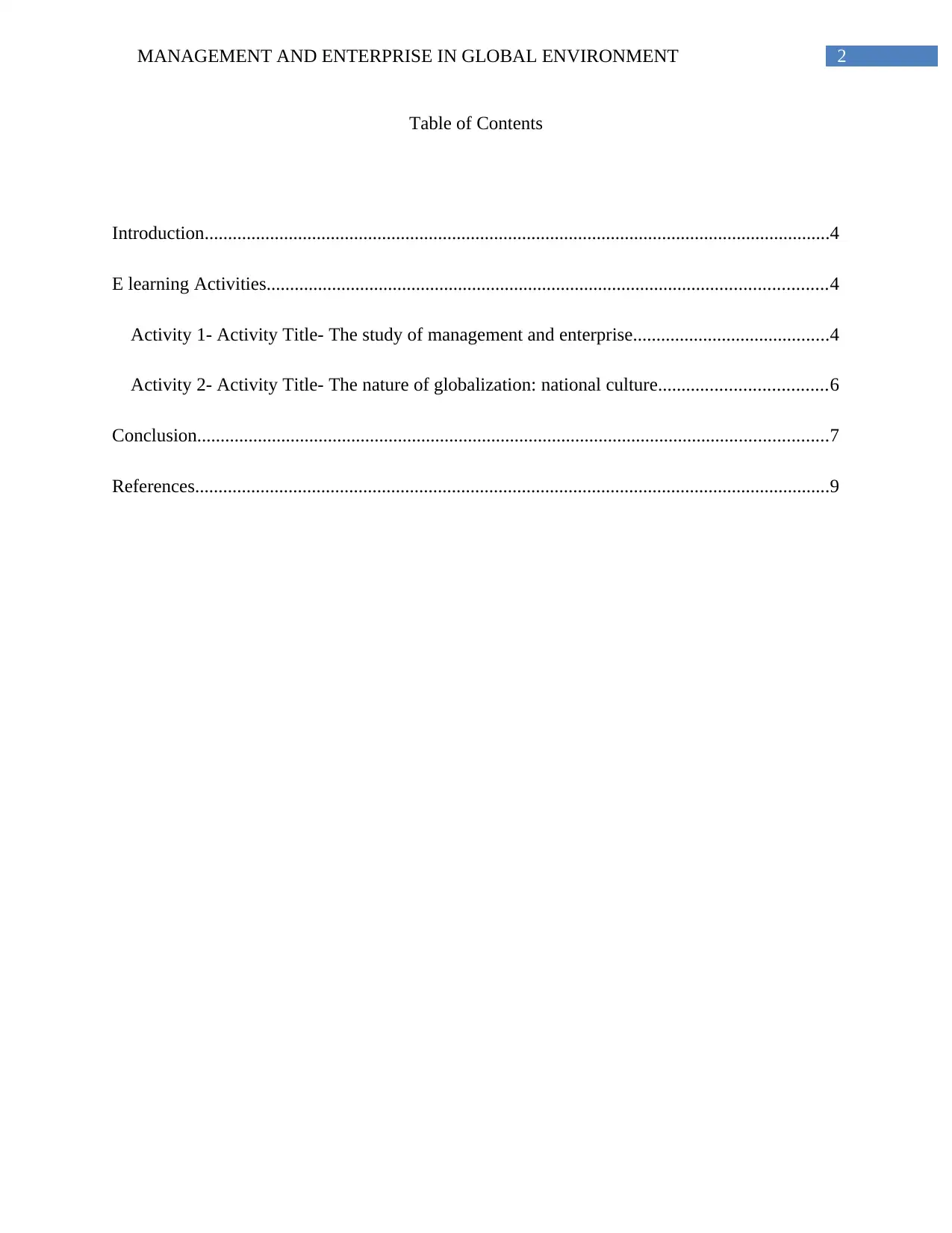
2MANAGEMENT AND ENTERPRISE IN GLOBAL ENVIRONMENT
Table of Contents
Introduction......................................................................................................................................4
E learning Activities........................................................................................................................4
Activity 1- Activity Title- The study of management and enterprise..........................................4
Activity 2- Activity Title- The nature of globalization: national culture....................................6
Conclusion.......................................................................................................................................7
References........................................................................................................................................9
Table of Contents
Introduction......................................................................................................................................4
E learning Activities........................................................................................................................4
Activity 1- Activity Title- The study of management and enterprise..........................................4
Activity 2- Activity Title- The nature of globalization: national culture....................................6
Conclusion.......................................................................................................................................7
References........................................................................................................................................9
⊘ This is a preview!⊘
Do you want full access?
Subscribe today to unlock all pages.

Trusted by 1+ million students worldwide
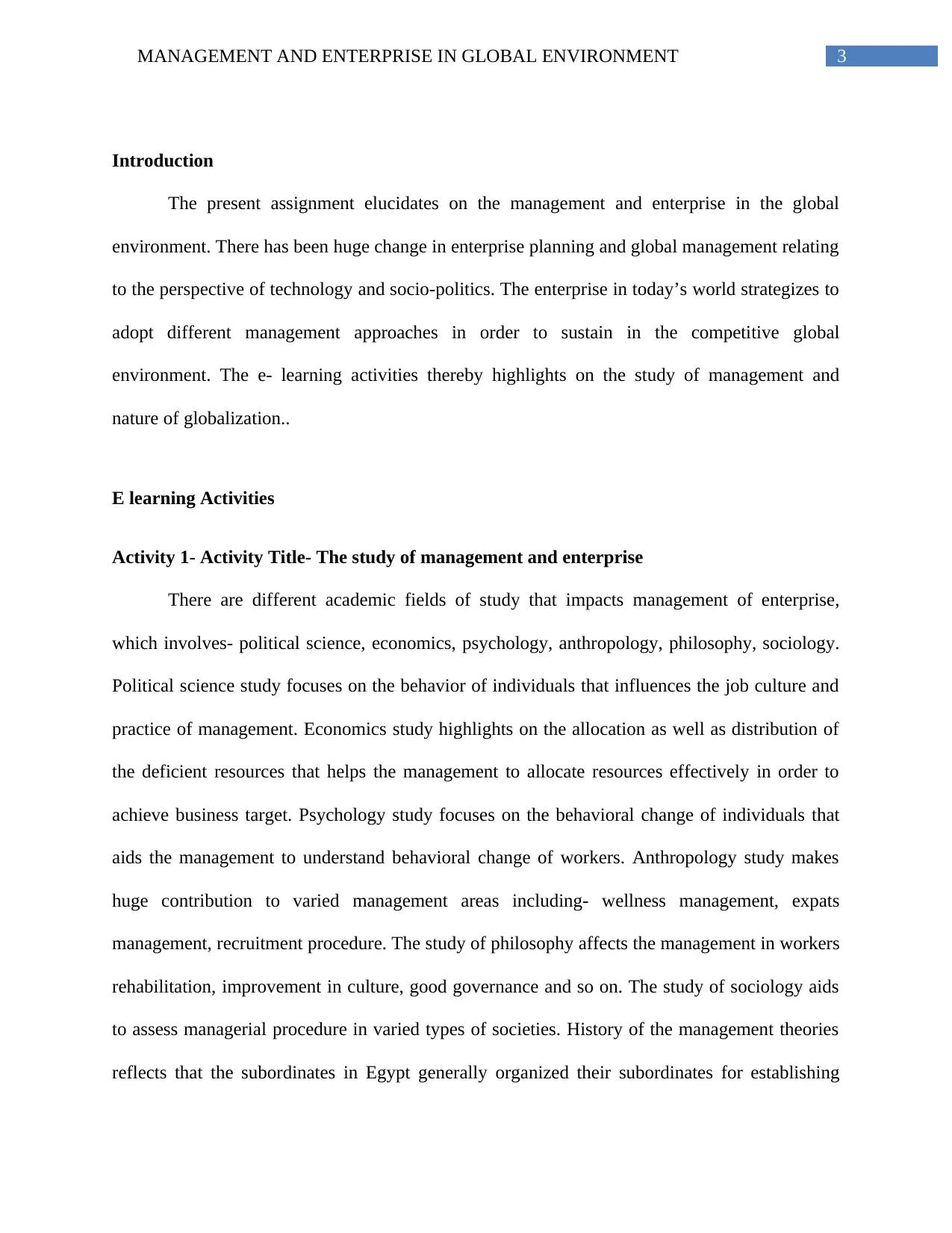
3MANAGEMENT AND ENTERPRISE IN GLOBAL ENVIRONMENT
Introduction
The present assignment elucidates on the management and enterprise in the global
environment. There has been huge change in enterprise planning and global management relating
to the perspective of technology and socio-politics. The enterprise in today’s world strategizes to
adopt different management approaches in order to sustain in the competitive global
environment. The e- learning activities thereby highlights on the study of management and
nature of globalization..
E learning Activities
Activity 1- Activity Title- The study of management and enterprise
There are different academic fields of study that impacts management of enterprise,
which involves- political science, economics, psychology, anthropology, philosophy, sociology.
Political science study focuses on the behavior of individuals that influences the job culture and
practice of management. Economics study highlights on the allocation as well as distribution of
the deficient resources that helps the management to allocate resources effectively in order to
achieve business target. Psychology study focuses on the behavioral change of individuals that
aids the management to understand behavioral change of workers. Anthropology study makes
huge contribution to varied management areas including- wellness management, expats
management, recruitment procedure. The study of philosophy affects the management in workers
rehabilitation, improvement in culture, good governance and so on. The study of sociology aids
to assess managerial procedure in varied types of societies. History of the management theories
reflects that the subordinates in Egypt generally organized their subordinates for establishing
Introduction
The present assignment elucidates on the management and enterprise in the global
environment. There has been huge change in enterprise planning and global management relating
to the perspective of technology and socio-politics. The enterprise in today’s world strategizes to
adopt different management approaches in order to sustain in the competitive global
environment. The e- learning activities thereby highlights on the study of management and
nature of globalization..
E learning Activities
Activity 1- Activity Title- The study of management and enterprise
There are different academic fields of study that impacts management of enterprise,
which involves- political science, economics, psychology, anthropology, philosophy, sociology.
Political science study focuses on the behavior of individuals that influences the job culture and
practice of management. Economics study highlights on the allocation as well as distribution of
the deficient resources that helps the management to allocate resources effectively in order to
achieve business target. Psychology study focuses on the behavioral change of individuals that
aids the management to understand behavioral change of workers. Anthropology study makes
huge contribution to varied management areas including- wellness management, expats
management, recruitment procedure. The study of philosophy affects the management in workers
rehabilitation, improvement in culture, good governance and so on. The study of sociology aids
to assess managerial procedure in varied types of societies. History of the management theories
reflects that the subordinates in Egypt generally organized their subordinates for establishing
Paraphrase This Document
Need a fresh take? Get an instant paraphrase of this document with our AI Paraphraser
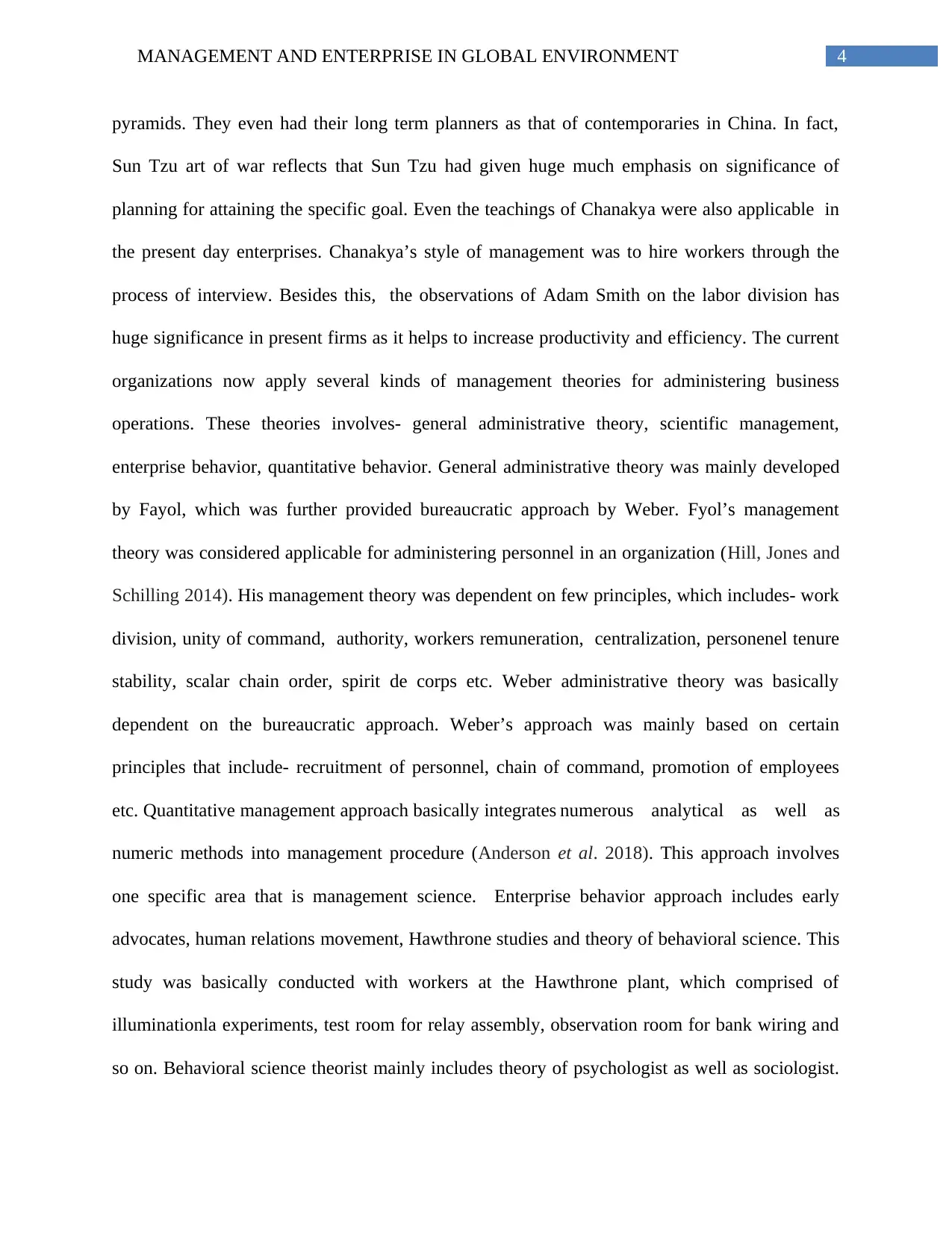
4MANAGEMENT AND ENTERPRISE IN GLOBAL ENVIRONMENT
pyramids. They even had their long term planners as that of contemporaries in China. In fact,
Sun Tzu art of war reflects that Sun Tzu had given huge much emphasis on significance of
planning for attaining the specific goal. Even the teachings of Chanakya were also applicable in
the present day enterprises. Chanakya’s style of management was to hire workers through the
process of interview. Besides this, the observations of Adam Smith on the labor division has
huge significance in present firms as it helps to increase productivity and efficiency. The current
organizations now apply several kinds of management theories for administering business
operations. These theories involves- general administrative theory, scientific management,
enterprise behavior, quantitative behavior. General administrative theory was mainly developed
by Fayol, which was further provided bureaucratic approach by Weber. Fyol’s management
theory was considered applicable for administering personnel in an organization (Hill, Jones and
Schilling 2014). His management theory was dependent on few principles, which includes- work
division, unity of command, authority, workers remuneration, centralization, personenel tenure
stability, scalar chain order, spirit de corps etc. Weber administrative theory was basically
dependent on the bureaucratic approach. Weber’s approach was mainly based on certain
principles that include- recruitment of personnel, chain of command, promotion of employees
etc. Quantitative management approach basically integrates numerous analytical as well as
numeric methods into management procedure (Anderson et al. 2018). This approach involves
one specific area that is management science. Enterprise behavior approach includes early
advocates, human relations movement, Hawthrone studies and theory of behavioral science. This
study was basically conducted with workers at the Hawthrone plant, which comprised of
illuminationla experiments, test room for relay assembly, observation room for bank wiring and
so on. Behavioral science theorist mainly includes theory of psychologist as well as sociologist.
pyramids. They even had their long term planners as that of contemporaries in China. In fact,
Sun Tzu art of war reflects that Sun Tzu had given huge much emphasis on significance of
planning for attaining the specific goal. Even the teachings of Chanakya were also applicable in
the present day enterprises. Chanakya’s style of management was to hire workers through the
process of interview. Besides this, the observations of Adam Smith on the labor division has
huge significance in present firms as it helps to increase productivity and efficiency. The current
organizations now apply several kinds of management theories for administering business
operations. These theories involves- general administrative theory, scientific management,
enterprise behavior, quantitative behavior. General administrative theory was mainly developed
by Fayol, which was further provided bureaucratic approach by Weber. Fyol’s management
theory was considered applicable for administering personnel in an organization (Hill, Jones and
Schilling 2014). His management theory was dependent on few principles, which includes- work
division, unity of command, authority, workers remuneration, centralization, personenel tenure
stability, scalar chain order, spirit de corps etc. Weber administrative theory was basically
dependent on the bureaucratic approach. Weber’s approach was mainly based on certain
principles that include- recruitment of personnel, chain of command, promotion of employees
etc. Quantitative management approach basically integrates numerous analytical as well as
numeric methods into management procedure (Anderson et al. 2018). This approach involves
one specific area that is management science. Enterprise behavior approach includes early
advocates, human relations movement, Hawthrone studies and theory of behavioral science. This
study was basically conducted with workers at the Hawthrone plant, which comprised of
illuminationla experiments, test room for relay assembly, observation room for bank wiring and
so on. Behavioral science theorist mainly includes theory of psychologist as well as sociologist.
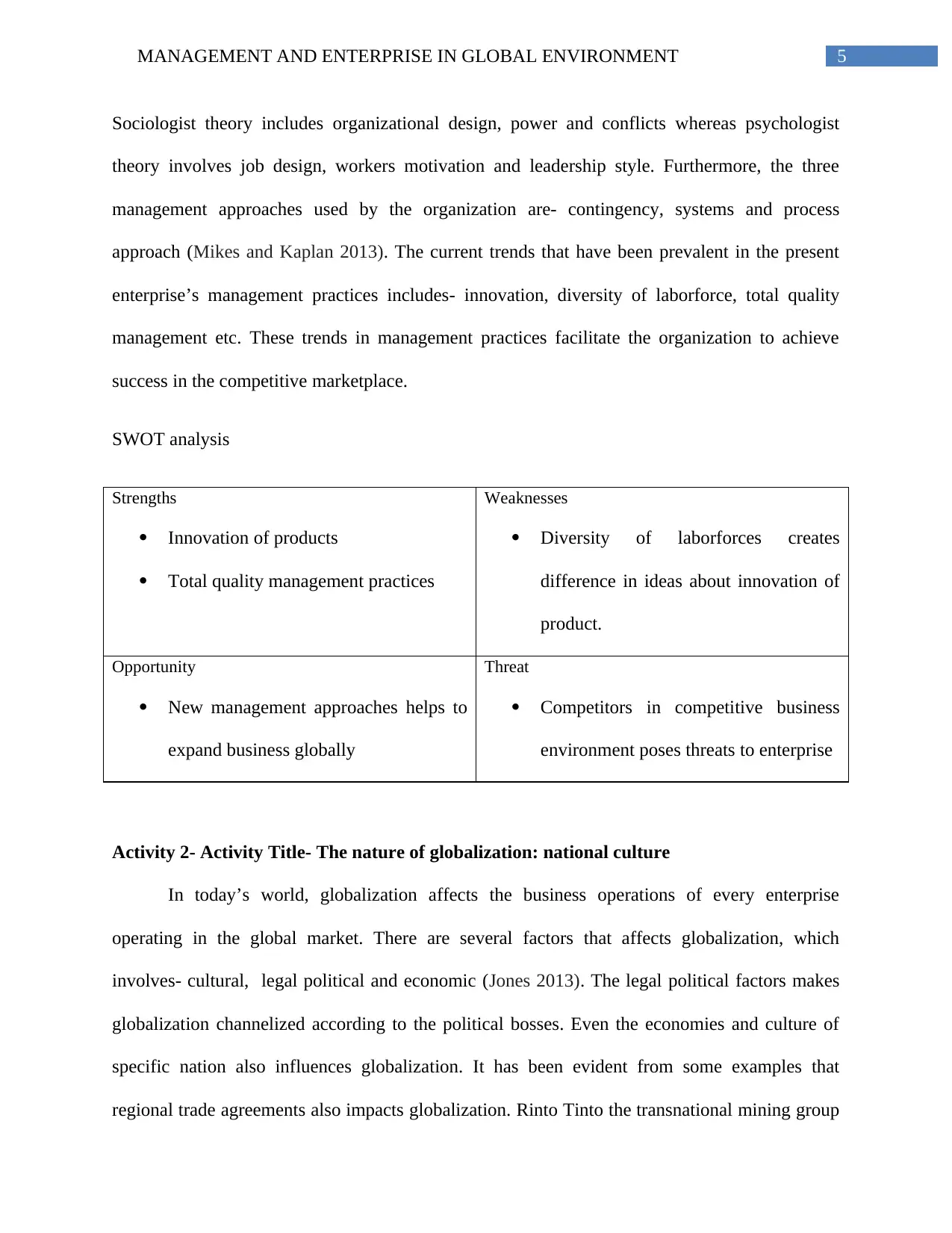
5MANAGEMENT AND ENTERPRISE IN GLOBAL ENVIRONMENT
Sociologist theory includes organizational design, power and conflicts whereas psychologist
theory involves job design, workers motivation and leadership style. Furthermore, the three
management approaches used by the organization are- contingency, systems and process
approach (Mikes and Kaplan 2013). The current trends that have been prevalent in the present
enterprise’s management practices includes- innovation, diversity of laborforce, total quality
management etc. These trends in management practices facilitate the organization to achieve
success in the competitive marketplace.
SWOT analysis
Strengths
Innovation of products
Total quality management practices
Weaknesses
Diversity of laborforces creates
difference in ideas about innovation of
product.
Opportunity
New management approaches helps to
expand business globally
Threat
Competitors in competitive business
environment poses threats to enterprise
Activity 2- Activity Title- The nature of globalization: national culture
In today’s world, globalization affects the business operations of every enterprise
operating in the global market. There are several factors that affects globalization, which
involves- cultural, legal political and economic (Jones 2013). The legal political factors makes
globalization channelized according to the political bosses. Even the economies and culture of
specific nation also influences globalization. It has been evident from some examples that
regional trade agreements also impacts globalization. Rinto Tinto the transnational mining group
Sociologist theory includes organizational design, power and conflicts whereas psychologist
theory involves job design, workers motivation and leadership style. Furthermore, the three
management approaches used by the organization are- contingency, systems and process
approach (Mikes and Kaplan 2013). The current trends that have been prevalent in the present
enterprise’s management practices includes- innovation, diversity of laborforce, total quality
management etc. These trends in management practices facilitate the organization to achieve
success in the competitive marketplace.
SWOT analysis
Strengths
Innovation of products
Total quality management practices
Weaknesses
Diversity of laborforces creates
difference in ideas about innovation of
product.
Opportunity
New management approaches helps to
expand business globally
Threat
Competitors in competitive business
environment poses threats to enterprise
Activity 2- Activity Title- The nature of globalization: national culture
In today’s world, globalization affects the business operations of every enterprise
operating in the global market. There are several factors that affects globalization, which
involves- cultural, legal political and economic (Jones 2013). The legal political factors makes
globalization channelized according to the political bosses. Even the economies and culture of
specific nation also influences globalization. It has been evident from some examples that
regional trade agreements also impacts globalization. Rinto Tinto the transnational mining group
⊘ This is a preview!⊘
Do you want full access?
Subscribe today to unlock all pages.

Trusted by 1+ million students worldwide
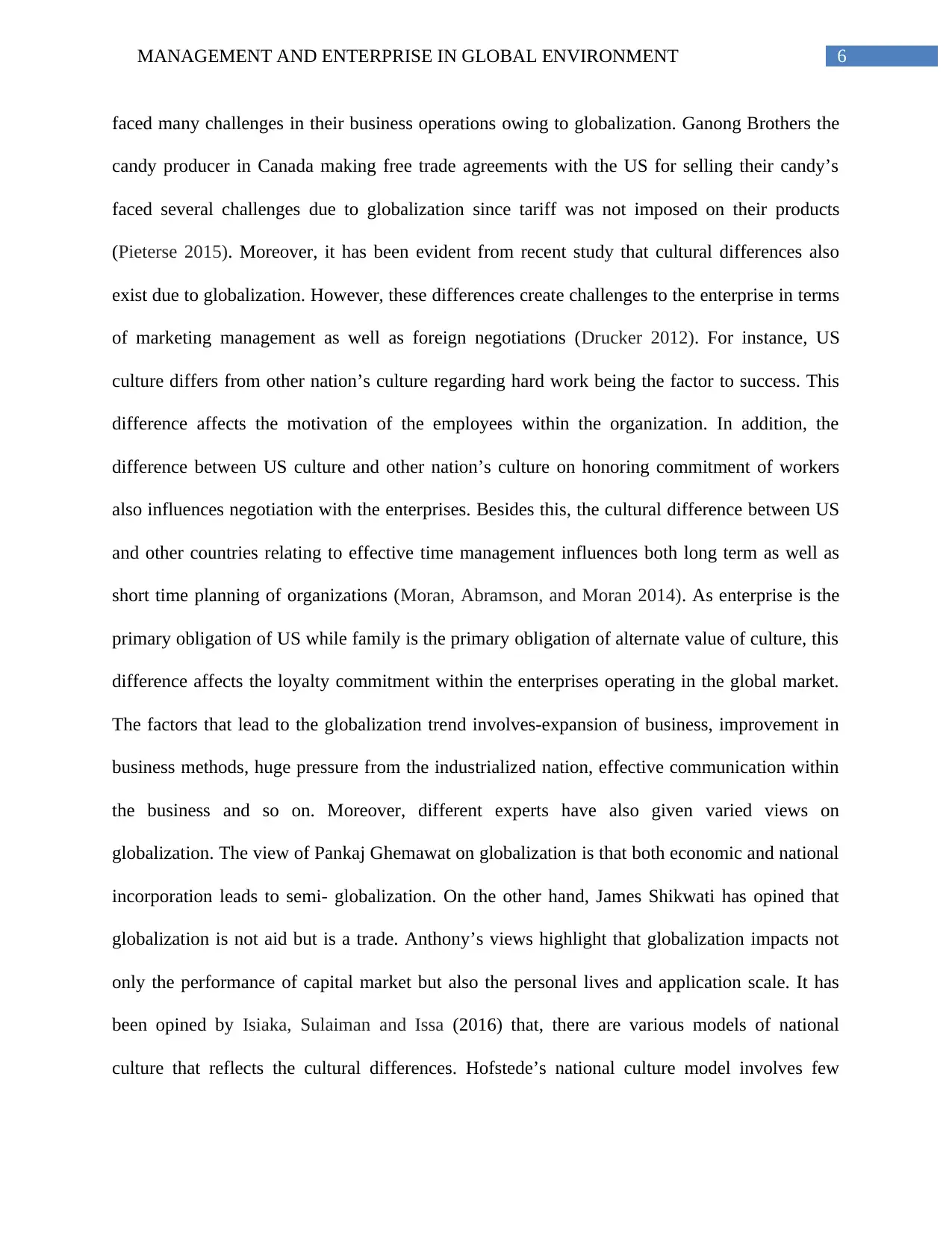
6MANAGEMENT AND ENTERPRISE IN GLOBAL ENVIRONMENT
faced many challenges in their business operations owing to globalization. Ganong Brothers the
candy producer in Canada making free trade agreements with the US for selling their candy’s
faced several challenges due to globalization since tariff was not imposed on their products
(Pieterse 2015). Moreover, it has been evident from recent study that cultural differences also
exist due to globalization. However, these differences create challenges to the enterprise in terms
of marketing management as well as foreign negotiations (Drucker 2012). For instance, US
culture differs from other nation’s culture regarding hard work being the factor to success. This
difference affects the motivation of the employees within the organization. In addition, the
difference between US culture and other nation’s culture on honoring commitment of workers
also influences negotiation with the enterprises. Besides this, the cultural difference between US
and other countries relating to effective time management influences both long term as well as
short time planning of organizations (Moran, Abramson, and Moran 2014). As enterprise is the
primary obligation of US while family is the primary obligation of alternate value of culture, this
difference affects the loyalty commitment within the enterprises operating in the global market.
The factors that lead to the globalization trend involves-expansion of business, improvement in
business methods, huge pressure from the industrialized nation, effective communication within
the business and so on. Moreover, different experts have also given varied views on
globalization. The view of Pankaj Ghemawat on globalization is that both economic and national
incorporation leads to semi- globalization. On the other hand, James Shikwati has opined that
globalization is not aid but is a trade. Anthony’s views highlight that globalization impacts not
only the performance of capital market but also the personal lives and application scale. It has
been opined by Isiaka, Sulaiman and Issa (2016) that, there are various models of national
culture that reflects the cultural differences. Hofstede’s national culture model involves few
faced many challenges in their business operations owing to globalization. Ganong Brothers the
candy producer in Canada making free trade agreements with the US for selling their candy’s
faced several challenges due to globalization since tariff was not imposed on their products
(Pieterse 2015). Moreover, it has been evident from recent study that cultural differences also
exist due to globalization. However, these differences create challenges to the enterprise in terms
of marketing management as well as foreign negotiations (Drucker 2012). For instance, US
culture differs from other nation’s culture regarding hard work being the factor to success. This
difference affects the motivation of the employees within the organization. In addition, the
difference between US culture and other nation’s culture on honoring commitment of workers
also influences negotiation with the enterprises. Besides this, the cultural difference between US
and other countries relating to effective time management influences both long term as well as
short time planning of organizations (Moran, Abramson, and Moran 2014). As enterprise is the
primary obligation of US while family is the primary obligation of alternate value of culture, this
difference affects the loyalty commitment within the enterprises operating in the global market.
The factors that lead to the globalization trend involves-expansion of business, improvement in
business methods, huge pressure from the industrialized nation, effective communication within
the business and so on. Moreover, different experts have also given varied views on
globalization. The view of Pankaj Ghemawat on globalization is that both economic and national
incorporation leads to semi- globalization. On the other hand, James Shikwati has opined that
globalization is not aid but is a trade. Anthony’s views highlight that globalization impacts not
only the performance of capital market but also the personal lives and application scale. It has
been opined by Isiaka, Sulaiman and Issa (2016) that, there are various models of national
culture that reflects the cultural differences. Hofstede’s national culture model involves few
Paraphrase This Document
Need a fresh take? Get an instant paraphrase of this document with our AI Paraphraser
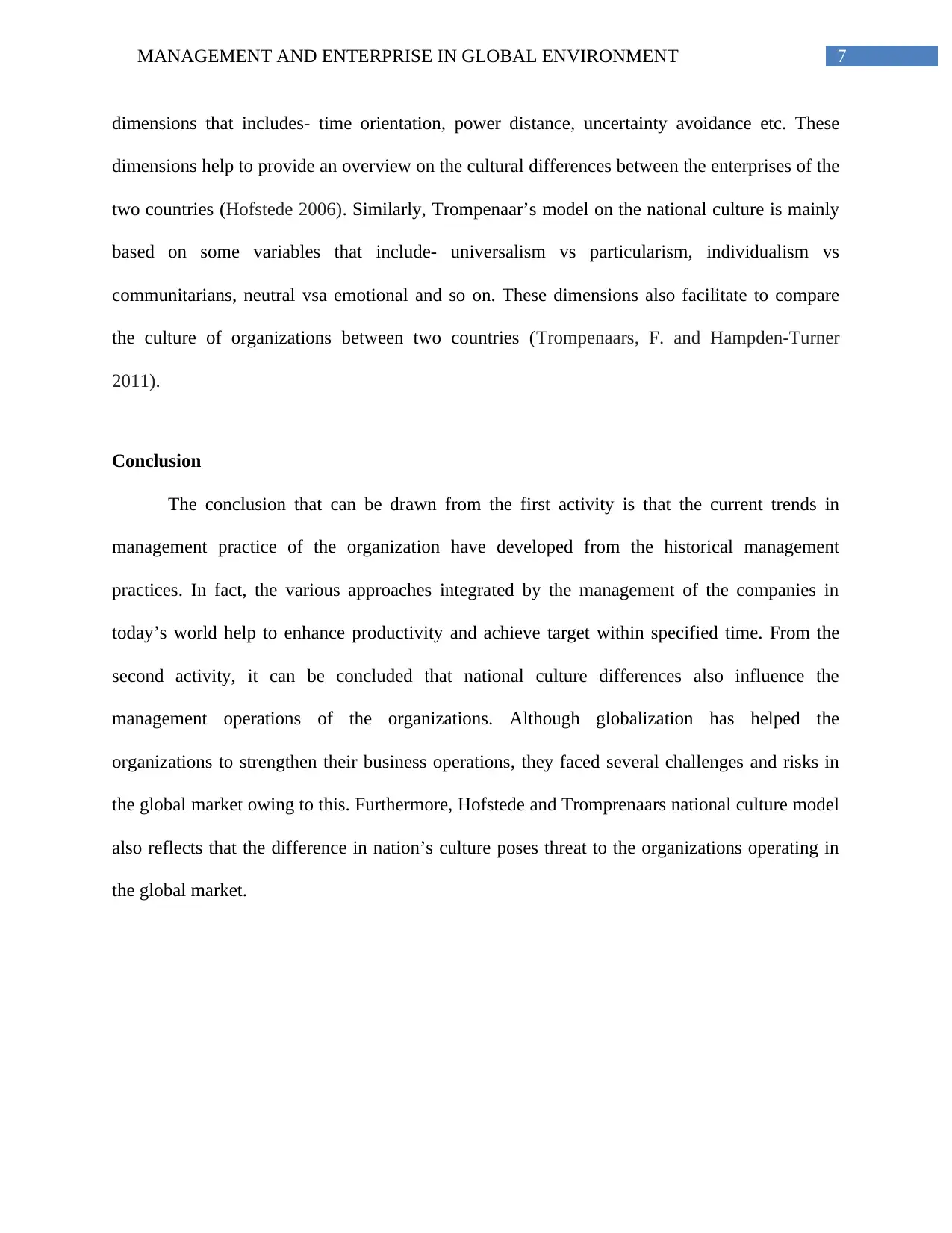
7MANAGEMENT AND ENTERPRISE IN GLOBAL ENVIRONMENT
dimensions that includes- time orientation, power distance, uncertainty avoidance etc. These
dimensions help to provide an overview on the cultural differences between the enterprises of the
two countries (Hofstede 2006). Similarly, Trompenaar’s model on the national culture is mainly
based on some variables that include- universalism vs particularism, individualism vs
communitarians, neutral vsa emotional and so on. These dimensions also facilitate to compare
the culture of organizations between two countries (Trompenaars, F. and Hampden-Turner
2011).
Conclusion
The conclusion that can be drawn from the first activity is that the current trends in
management practice of the organization have developed from the historical management
practices. In fact, the various approaches integrated by the management of the companies in
today’s world help to enhance productivity and achieve target within specified time. From the
second activity, it can be concluded that national culture differences also influence the
management operations of the organizations. Although globalization has helped the
organizations to strengthen their business operations, they faced several challenges and risks in
the global market owing to this. Furthermore, Hofstede and Tromprenaars national culture model
also reflects that the difference in nation’s culture poses threat to the organizations operating in
the global market.
dimensions that includes- time orientation, power distance, uncertainty avoidance etc. These
dimensions help to provide an overview on the cultural differences between the enterprises of the
two countries (Hofstede 2006). Similarly, Trompenaar’s model on the national culture is mainly
based on some variables that include- universalism vs particularism, individualism vs
communitarians, neutral vsa emotional and so on. These dimensions also facilitate to compare
the culture of organizations between two countries (Trompenaars, F. and Hampden-Turner
2011).
Conclusion
The conclusion that can be drawn from the first activity is that the current trends in
management practice of the organization have developed from the historical management
practices. In fact, the various approaches integrated by the management of the companies in
today’s world help to enhance productivity and achieve target within specified time. From the
second activity, it can be concluded that national culture differences also influence the
management operations of the organizations. Although globalization has helped the
organizations to strengthen their business operations, they faced several challenges and risks in
the global market owing to this. Furthermore, Hofstede and Tromprenaars national culture model
also reflects that the difference in nation’s culture poses threat to the organizations operating in
the global market.
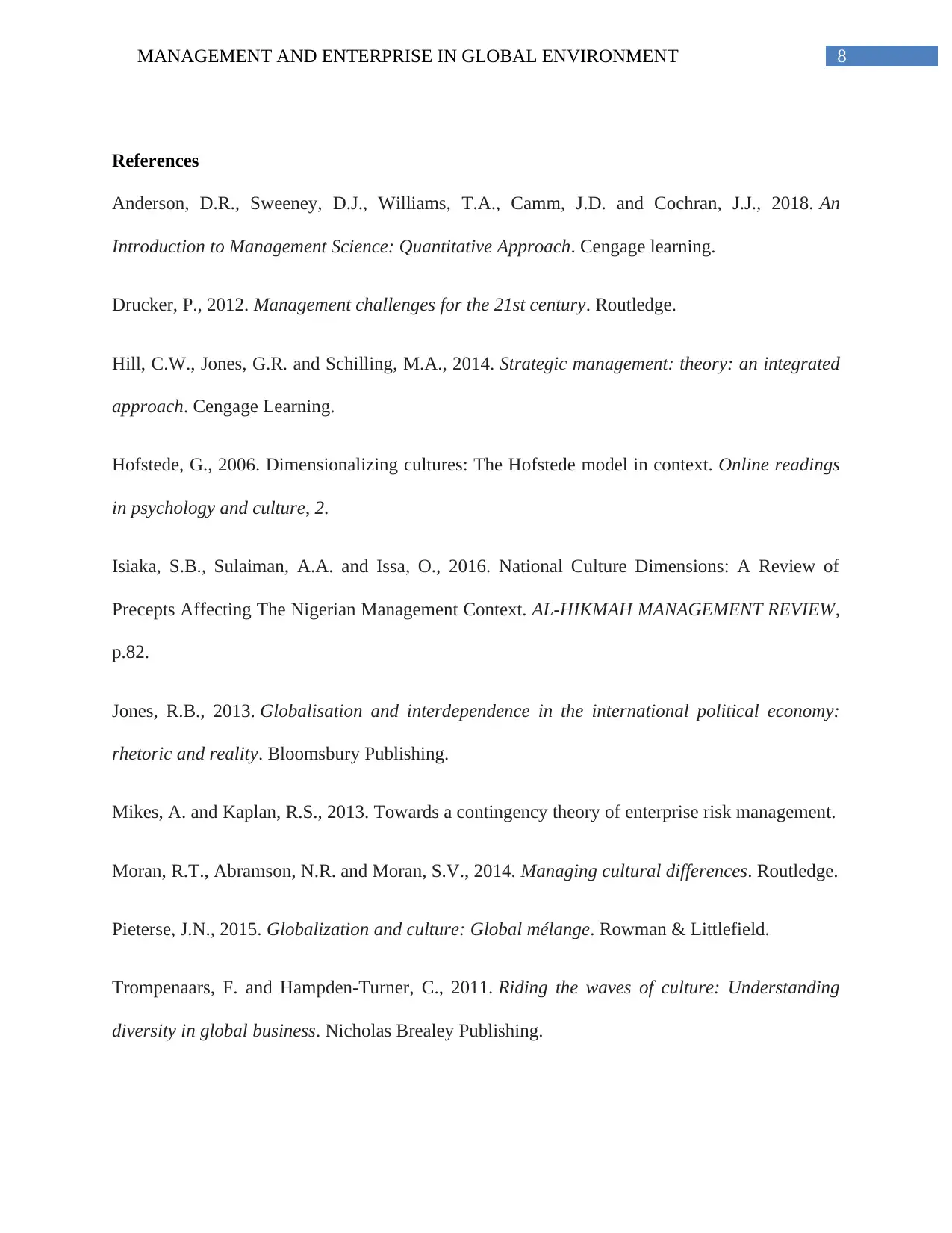
8MANAGEMENT AND ENTERPRISE IN GLOBAL ENVIRONMENT
References
Anderson, D.R., Sweeney, D.J., Williams, T.A., Camm, J.D. and Cochran, J.J., 2018. An
Introduction to Management Science: Quantitative Approach. Cengage learning.
Drucker, P., 2012. Management challenges for the 21st century. Routledge.
Hill, C.W., Jones, G.R. and Schilling, M.A., 2014. Strategic management: theory: an integrated
approach. Cengage Learning.
Hofstede, G., 2006. Dimensionalizing cultures: The Hofstede model in context. Online readings
in psychology and culture, 2.
Isiaka, S.B., Sulaiman, A.A. and Issa, O., 2016. National Culture Dimensions: A Review of
Precepts Affecting The Nigerian Management Context. AL-HIKMAH MANAGEMENT REVIEW,
p.82.
Jones, R.B., 2013. Globalisation and interdependence in the international political economy:
rhetoric and reality. Bloomsbury Publishing.
Mikes, A. and Kaplan, R.S., 2013. Towards a contingency theory of enterprise risk management.
Moran, R.T., Abramson, N.R. and Moran, S.V., 2014. Managing cultural differences. Routledge.
Pieterse, J.N., 2015. Globalization and culture: Global mélange. Rowman & Littlefield.
Trompenaars, F. and Hampden-Turner, C., 2011. Riding the waves of culture: Understanding
diversity in global business. Nicholas Brealey Publishing.
References
Anderson, D.R., Sweeney, D.J., Williams, T.A., Camm, J.D. and Cochran, J.J., 2018. An
Introduction to Management Science: Quantitative Approach. Cengage learning.
Drucker, P., 2012. Management challenges for the 21st century. Routledge.
Hill, C.W., Jones, G.R. and Schilling, M.A., 2014. Strategic management: theory: an integrated
approach. Cengage Learning.
Hofstede, G., 2006. Dimensionalizing cultures: The Hofstede model in context. Online readings
in psychology and culture, 2.
Isiaka, S.B., Sulaiman, A.A. and Issa, O., 2016. National Culture Dimensions: A Review of
Precepts Affecting The Nigerian Management Context. AL-HIKMAH MANAGEMENT REVIEW,
p.82.
Jones, R.B., 2013. Globalisation and interdependence in the international political economy:
rhetoric and reality. Bloomsbury Publishing.
Mikes, A. and Kaplan, R.S., 2013. Towards a contingency theory of enterprise risk management.
Moran, R.T., Abramson, N.R. and Moran, S.V., 2014. Managing cultural differences. Routledge.
Pieterse, J.N., 2015. Globalization and culture: Global mélange. Rowman & Littlefield.
Trompenaars, F. and Hampden-Turner, C., 2011. Riding the waves of culture: Understanding
diversity in global business. Nicholas Brealey Publishing.
⊘ This is a preview!⊘
Do you want full access?
Subscribe today to unlock all pages.

Trusted by 1+ million students worldwide
1 out of 9
Related Documents
Your All-in-One AI-Powered Toolkit for Academic Success.
+13062052269
info@desklib.com
Available 24*7 on WhatsApp / Email
![[object Object]](/_next/static/media/star-bottom.7253800d.svg)
Unlock your academic potential
Copyright © 2020–2026 A2Z Services. All Rights Reserved. Developed and managed by ZUCOL.


